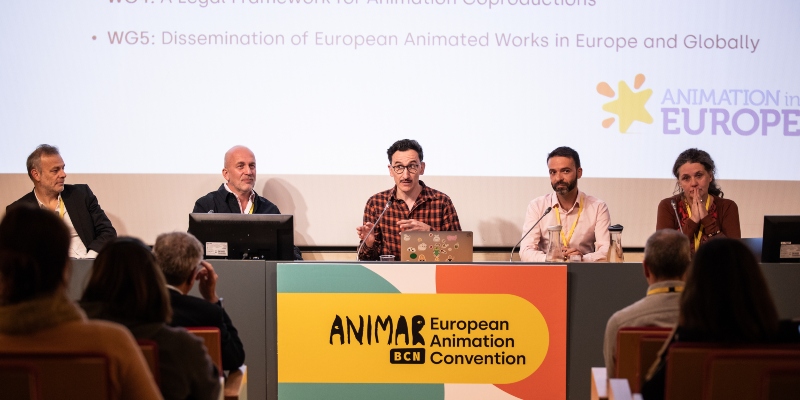The second edition of the political forum Animar_BCN held from 22 to 24 November in Barcelona, Spain expanded both in terms of the number of experts, over 80, and the number of countries represented, totalling 25, encompassing public bodies, broadcasters, production representatives and pan-European institutions.
Over three days of debates at Animar_BCN, key figures in the animation value chain, including organisations such as Animation in Europe and CEE Animation, engaged in discussions aimed at enhancing the European animation industry’s operational mechanisms. This convergence comprised government officials, educational leaders, industry veterans, and broadcasters.
This forum was a fertile ground for collaborative thinking, which led to tangible recommendations such as the need for stronger funding strategies across Europe, the development of compatible standards for co-productions, a stronger emphasis on audience building, the retention of talent and original IP by independent producers.
Animation in Europe president Philippe Alessandri said, “Animar_BCN has established itself as a pivotal political forum, playing a crucial role in addressing the complex challenges facing our industry. It’s not just a meeting place; it’s a breeding ground for innovative ideas and realistic recommendations which are essential for the sustainability, future and vitality of European animation. This convention has become a catalyst for meaningful change, where thought leaders come together to shape the future of our industry.”
ProAnimats vice president Marta Alonso added, “The success of Animar_BCN can be attributed to its unique ability to centralise the collective interests of the European animation industry, transcending the usual territorial or specific concerns of individual actors. This congress has emerged as a beacon of unity, fostering a collaborative spirit that encourages a holistic approach. By bridging diverse perspectives, Animar_BCN has become a vital platform for shaping a cohesive and dynamic future for animation across Europe.”
At Animar_BCN, five critical subjects with one think tank each were at the forefront of discussions, each pivotal to the future of European animation:
- The investment of media services in animation content: Co-chaired by Finland Ministry of Employment and the Economy ministerial adviser Petra Tarjanne, and Animation in Europe chairman & Watch Next CEO Philippe Alessandri.
- Direct public & tax related funding in European animation: Co-chaired by EFAD – European Film Agency Directors secretary general Julie-Jeanne Régnault, and Animation in Europe vice-chair & Akkord Film CEO Dirk Beinhold.
- A legal framework for animation co-productions: Co-chaired by Norwegian Film Institute coproduction and international financing advisor Benedikte Danielsen, and Animation in Europe vice-chair & Peekaboo CEO Iván Agenjo.
- Market financing, equity investment, private-public co-financing, and cashflow facilities: Co-chaired by Animation Ireland CEO Ronan McCabe, and Animation in Europe treasurer & Pikkukala CEO Pablo Jordi.
- Distribution of European animated works in Europe and globally: Co-chaired by Les Femmes S’Animent (LFA) founding member and vice president Eleanor Coleman, and Animation in Europe vice-chair & Moetion Films CEO Moe Honan.
The think tanks reached a series of conclusions following discussions which led to a set of concrete recommended actions aimed at policy makers:
- Introduce a requirement to consider the diversity of genres and age demographic within the European quota and investments obligations.
- Revise the AVMS Directive and its guidelines to better achieve the initial goal of involving streamers in the financing of European works.
- Urgently work on a legal framework which acknowledges animation specificities in order to encourage and streamline European coproductions for series.
- Establish effective funding support for dubbing to enhance the distribution of European animation series and films across Europe, and internationally.
- Create a meeting platform or event for production companies who wish to scale up and for equity investors interested in audiovisual content.
- Define children and youth content as difficult productions, to allow for higher public financing supports, as well as enhanced development funding.
- Facilitate better access for low capacity countries to international co-productions by revisiting Creative Europe guidelines and improving minority co-production schemes.
Animation in Europe will report at MIFA Annecy, in June 2024, on the first steps taken in response to these recommendations.

